Collaboration as Smart as the Students It Supports
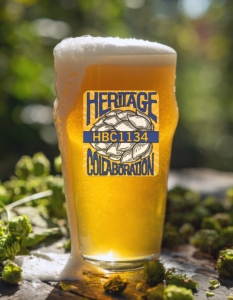
Close up shot of a fresh high quality gold foamy beer poured in a transparent glass on a background of collected biological hop flowers in plantation with a sun shining.
COLLABORATION AS SMART AS THE STUDENTS IT SUPPORTS
Some of the best ideas take shape over a pint of beer. Take, for example, Heritage Collaboration, a partnership between one of Yakima’s largest hop growers and three craft breweries, all to raise funds for Heritage University scholarships. It began with a spark of an idea.
Heritage University board member Ellen Wallach is known for her hands-on approach to her service to the organizations she supports. A member of Heritage’s fund development committee, she is always trying to find creative ways to help the university build funding streams that can lead to long-term support for the institution and its students. A conversation with a dear friend sparked one such idea. Her friend’s neighbor Manny Chao is the founder and co-owner of Georgetown Brewing, a popular Seattle brewery. She asked her friend if she could introduce her to Chao.
STEP ONE-BREWERY ONE
“I had this idea that Georgetown and Heritage could work together to build an income stream for Heritage that would also serve their (Georgetown’s) interests,” she said.
Her friend reached out to Chao and told him a bit about Heritage and the work the university does in the Yakima Valley. Most of the hops that Chao uses to brew his beers come from the areas surrounding the university. The farmworkers who care for and harvest the hops he depends upon are the families, friends and neighbors of the students who attend Heritage. Chao was intrigued.
“I was attracted by the whole idea of outreach to indigenous and immigrant families,” he said. “I, myself, am an immigrant. My family moved to the United States when I was a child so I could have a better education and more opportunities. There was a natural tie between Georgetown and the Yakima Valley, and providing educational opportunities for the families of the migrant workers who work so hard added to the appeal.”
However, Chao said the impact could be greater than just his brewery producing a single beer. “There are so many breweries in Washington state. I told Ellen we should bring in a hop grower to provide hops to several breweries and bring them on board, which would help spread the word about Heritage further.”
Wallach was on it! She knew just who to call— fellow Heritage board member Bob Gerst.
STEP TWO – BRING IN THE HOPS
“Ellen called and told me about her discussion with Manny. She asked if I knew who she could work with to capitalize on the idea,” said Gerst.
He knows a thing or two about the players in the hops and beer game; he is Vice President of Human Resources at John I. Haas, one of the largest hops producers in the state of Washington and, for that matter, the world. Haas has long been a supporter of Heritage University and its students. Over the years, they’ve sponsored the university’s largest fundraising event, Scholarship Dinner, provided student internship opportunities, and hired its graduates.
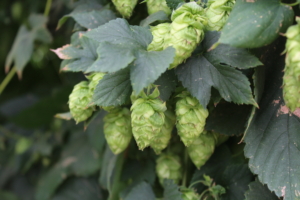
HBC 1134
He explained that while supporting Heritage and its students feels good, it is really a strategic move.
“Supporting Heritage makes good business sense,” he said. “The more educated we can make the workforce in the Yakima Valley, the better we all are, whether it is in the number of people we (Haas) hire or the environment that is created by an educated population. We are all better off by Heritage being successful.
“My role in this project was connecting the dots.”
STEP THREE-THE BEER MAKERS
Gerst knew about a new experimental hop variety that Haas’s sales force was starting to push out to brewers—HBC1134.
Michael Ferguson is the hop breeder extraordinaire who developed HBC1134. He’s spent several years breeding, growing, testing, and growing and testing again and again new varieties of hops in search of one that would produce a European-style hop but with much better yields that need less land and resources to produce than the hops currently being used. The key was it not only had to meet these production standards, but it also had to have the scent and flavor that matched the old variety, and those results had to be consistent year after year with every generation of cloned and propagated plants. Not an easy task!
“You’re doing well as a breeder if you get one good variety out of every 100,000 plants,” said Ferguson.
HBC1134 looked to be a winner. He sent a small sample to Haas brewmaster Virgil McDonald for the next step in the experiment, developing the recipe.
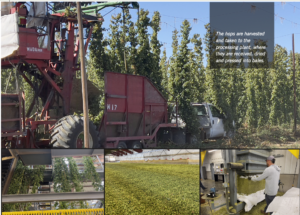
“We take an innocuous beer, add the hop, and taste the beer to identify the flavors the hop throws,” said McDonald. “Then we catalog it and try it with different yeast strains and malts. You know pretty quickly in the first brew or two if you have something to move forward.”
McDonald liked what he was tasting with HBC1134. It lends itself to a nice pilsner or lager- style beer, he said.
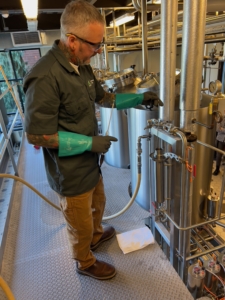
Brewer Max Snider draws a sample of Heritage Collaboration Lager.
At the time he heard the news about the yet- to-be-named Heritage Collaboration, he just happened to be in conversations with Chao about his desire to build a new recipe for a lager. The timing was perfect! Georgetown needed hops and wanted to collaborate. Haas had the hops, wanted to collaborate, and needed brewers to
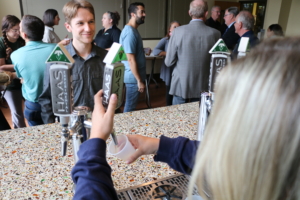
The first batch is served at Haas’s tasting room.
introduce beers made from the hop to consumers. Plus, both wanted to do something to support Heritage students. All that remained was to bring a few more brewers on board.
Chao reached out to his good friend Kevin Smith. Smith is the owner of Bale Breaker Brewing Company in Yakima. When he heard about the opportunity to create a beer using the new hop and do good for his community, he joined the collaboration.
“We enjoy making these charitable beers to give back to the community,” Smith said. “We were excited about making good beer with friends and supporting Heritage University, an educational institution in our own backyard.”
At the same time, Haas’s sales team reached out to another Yakima brewer, Zack Turner, at Single Hill Brewing. They were the first brewery to release their version of Heritage Collaboration at a launch event in early October.
STEP FOUR – DRINK UP!
With the wheels in motion and all the initial players on board, all that was left was to brew up some batches and launch it out into the world. Haas was the first to go live. They hosted a tasting party in late September showcasing the basic brew recipe that the craft brewers would build upon.
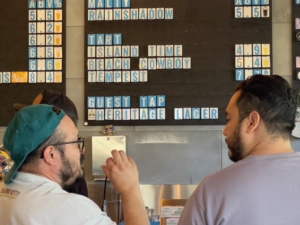
The public got its first taste of Heritage Collaboration Lager at Single Hill Brewing in Yakima.
Single Hill followed suit a few weeks later. In mid-October, Heritage hosted an alumni gathering coinciding with the launch day for Heritage Collaboration at Bale Breaker, and a second alumni gathering took place in November at Georgetown for their brew launch. At each brewery, a portion of the proceeds from the sale of their version of Heritage Collaboration are directed to Heritage University for scholarships.
Just how far Heritage Collaboration could go and how big an impact it could have on students remains to be seen. It all depends upon consumer tastes and demand for the hop that has yet to be officially named. However, said David Wise, vice president for advancement at Heritage, the impact has the potential to be great.
“Every successful venture started as an idea that grows into action and has a host of people behind it that believed in its power. When you think about it, this is the story of Heritage and our students, how we started, how we grew, and how we’ve been successful,” he said. “We’re all raising our pints, cheering on this grand collaboration, excited about what the future may bring.” ![]()
